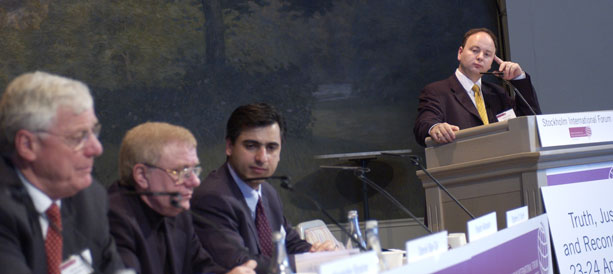
 |
|||||||||
| You are here: Truth, Justice and Reconciliation | |||||||||
|
Participants Countries and organizations Conference documentation Conference programme 
|
 Conference Three: Truth, Justice and Reconciliation 23 April – 24 April, 2002 The theme for the third conference, “Truth, Justice and Reconciliation”, was chosen with a starting point focusing on a way of coming to terms with the past in a future-oriented spirit. The central issue here was how to move forward and live with painful memories of injustices, with the legacy of past atrocities and authoritarian rule. There is great need for more knowledge about the role and significance of reconciliation in political, social and psychological processes. The conference examined ways in which reconciliation initiatives could be created, how societies could be involved and mobilised, and ultimately whether and how former enemies could find common ground and live together after intractable conflicts. When is reconciliation possible? How can it be achieved and by what means? The conference examined the dilemma of balancing the search for truth about past horrors and the striving for justice, with the need to look forward towards a future in which past events are no longer allowed to define the conditions of existence of a nation’s citizens. The Forum discussed whether it is possible for former enemies to find common ground, a modus vivendi, and live together in the same society after horrific bloodshed or a bitter, long-standing conflict, and what approaches might be most successful in achieving a state of peaceful coexistence. A number seminars examined experiences from individual countries. Various conflicts were described: Bosnia and Herzegovina, Cambodia, Germany and Poland, Rwanda and South Africa. Although the Forum itself imposed no restrictions on what could or could not be discussed, as far as possible participants avoided debating unresolved contemporary conflicts. They attempted instead to discuss the issues in terms of possible solutions and strategies for moving forward. Delegations from 40 countries attended this Forum. Several countries were represented by their Heads of State, and many more by Cabinet Ministers. Representatives from a number of international organisations (notably the United Nations and the European Union) also attended, as did a host of international experts. The keynote speakers included Xanana Gusmão, who was then the new President-elect of East Timor. |
||||||||
| For information about this production and the Stockholm International Forum Conference Series please go to www.humanrights.gov.se or contact Information Rosenbad, SE-103 33 Stockholm, Sweden | |||||||||